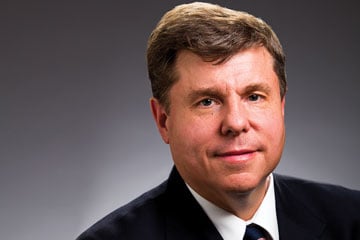
The University of Calgary Faculty of Law is entering into a new partnership with the University of Ottawa’s Certificate in Common Law in French in hopes of improving access to justice for French-speaking Albertans. The University of Calgary Faculty of Law is entering into a new partnership with the University of Ottawa’s Certificate in Common Law in French in hopes of improving access to justice for French-speaking Albertans.

The University of Calgary Faculty of Law is entering into a new partnership with the University of Ottawa’s Certificate in Common Law in French in hopes of improving access to justice for French-speaking Albertans.
The CCLF, first launched in partnership with the University of Saskatchewan College of Law three years ago, allows students the opportunity to develop their skills in legal writing and advocacy in the French language.
Ian Holloway, dean of the Faculty of Law at the University of Calgary, says he is excited about what the new partnership has to offer for his students and is grateful for the University of Ottawa’s leadership in this initiative.
“It's a modest but important step in furthering the interest of access to justice, in producing lawyers who are capable of practising in the French language as well as English, but also giving opportunities for legal study for francophones,” Holloway says.
Justin Kingston, partner at McCuaig Desrochers LLP and chairman of the French-speaking Legal Professionals’ Association of Alberta, says that under s. 530 of the Criminal Code, individuals have the right to a trial in the official language of their choice. Under these provisions, Kingston says there is a huge shortage of lawyers and judges in Alberta who would be able to conduct a full trial in French.
The shortcomings extend past the province of Alberta. Back in 2009, the Department of Justice released the Canada-Wide Analysis of Official Languages Training Needs in the Area of Justice report.
Caroline Magnan, director of the CCLF, said the report revealed that not only do French-speaking litigants experience delays, but they often aren’t aware of the certain rights afforded to them within the legal system.
Magnan says this was an important factor in the development of the CCLF program as it stands today.
“One of the recommendations in the report was for law schools to work together to offer more courses in French common law so that future lawyers would be able to offer their legal services in French to those French-speaking litigants,” Magnan says. “The University of Ottawa’s programme de common law en français existed for more than 40 years and has an expertise in French common law and we thought that it would be worthwhile to partner with certain institutions to be able to offer these courses in French.”
Apart from the University of Ottawa, the only university that offers a complete common law program in French is the Université de Moncton. Holloway says the CCLF program will enable graduates to not only serve a broader client base in Alberta but also pursue a legal career in areas of government, such as the Department of Justice, where knowledge of the French language is an asset.
Denise Brunsdon, a lawyer at Bennett Jones LLP in Alberta and co-founder of Lawyers for Education, Access, and Diversity in Alberta, says the discussion around access to justice is often focused on quantitative measures — increasing services to more individuals.
However, she says the quality of services also needs to be addressed.
“One of the things that we at LEAD and other lawyers are talking about is access to justice substantively, in terms of advocates who really understand and identify with populations who were made vulnerable or populations who are underrepresented,” Brunsdon says.
Brunsdon says legal professionals across the country are becoming increasingly aware that improvements must be made in the proper representation of all clients they serve.
“Programs like the new one between University of Calgary and the University of Ottawa are one example of things that give us hope at the profession is certainly moving in the right direction and wants to be more representative,” Brunsdon says.